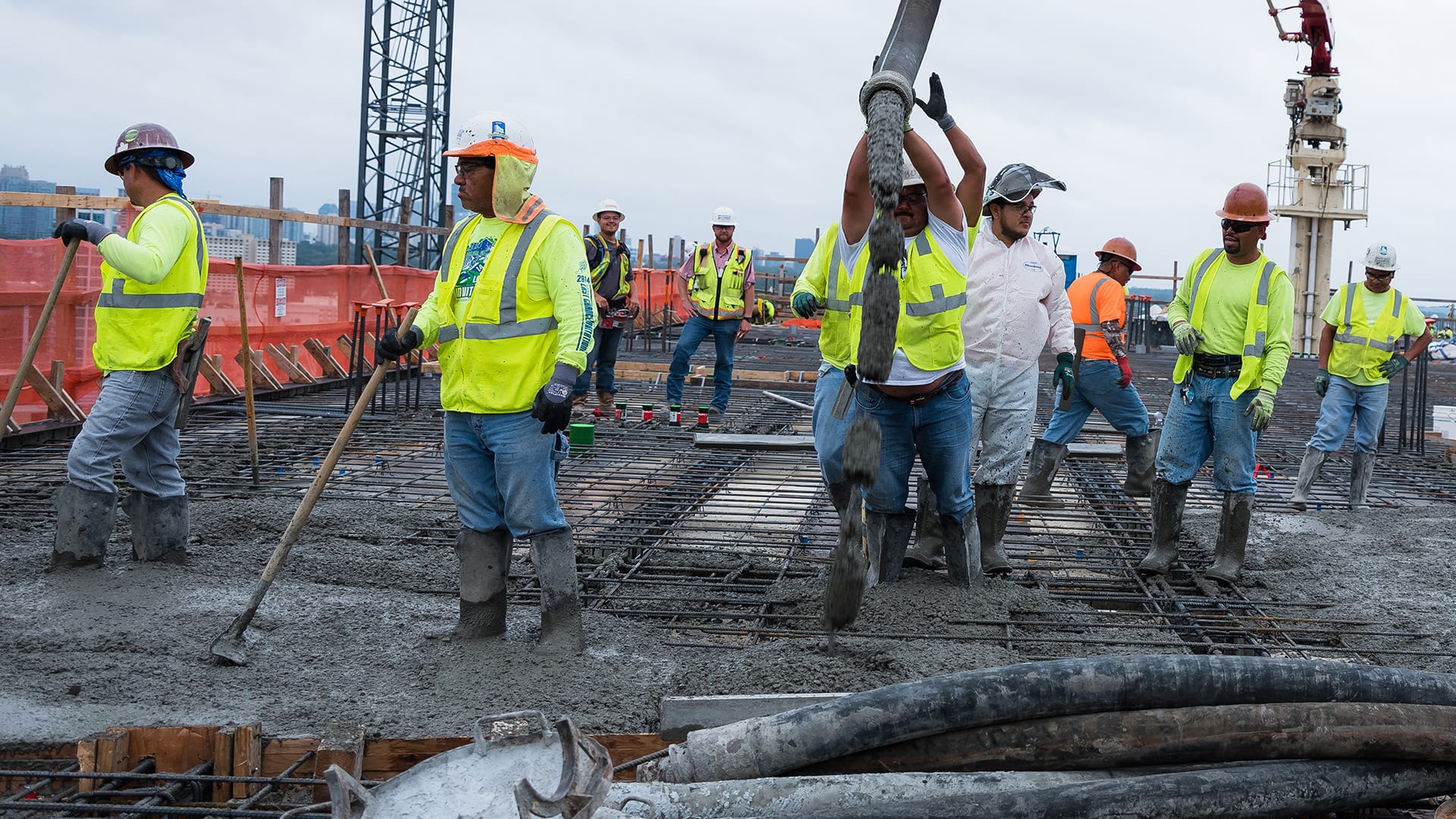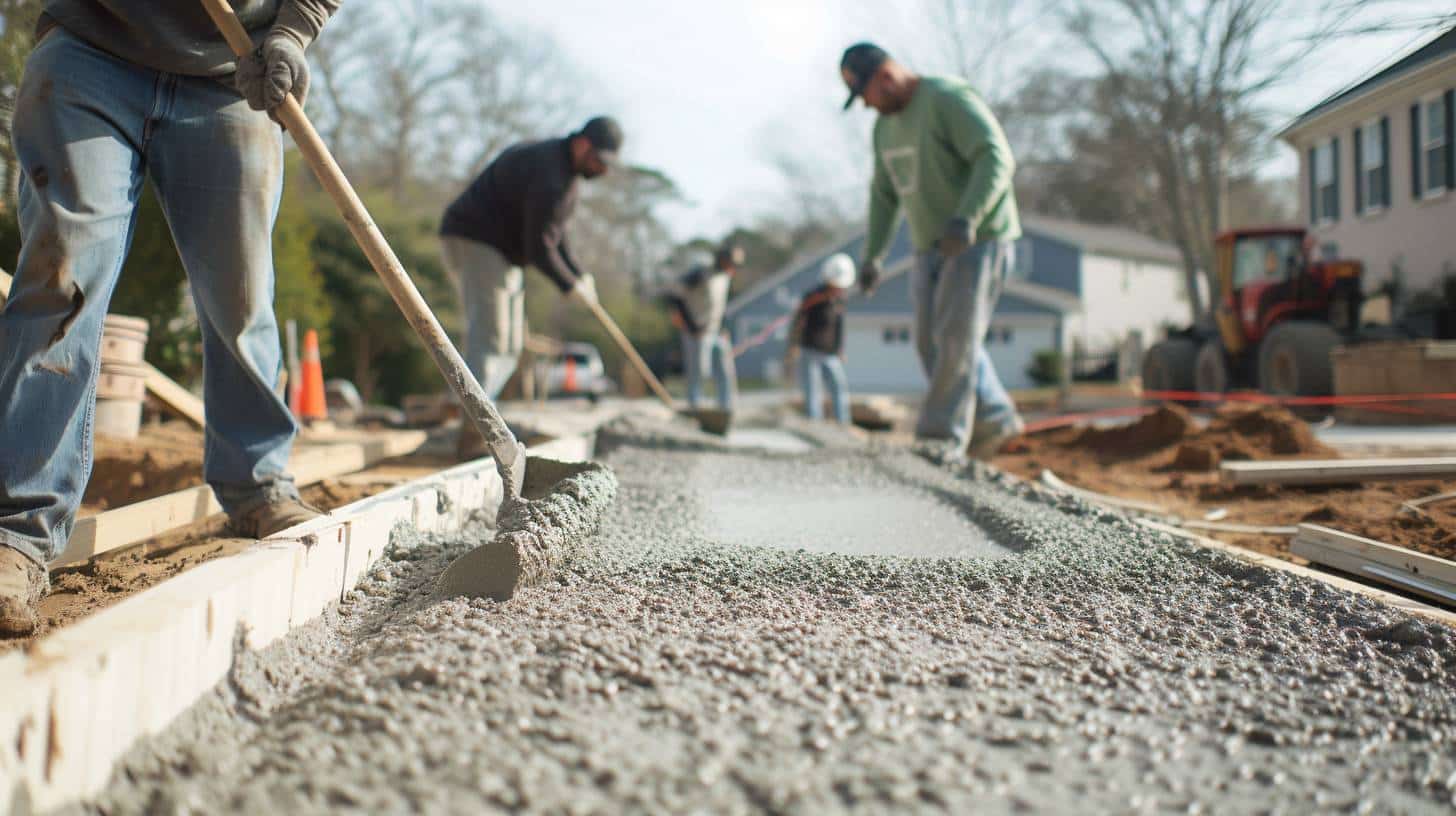Transform your outdoor space with durable designs from TJ Concrete Contractor

Understanding the Essential Duty of a Concrete Professional in Modern Building And Construction and Style
Concrete specialists are important to the building and construction and style markets. Their competence guarantees that structures are not just sturdy yet also visually pleasing. They involve in various duties, from project planning to high quality control, and work together with designers and architects. With evolving trends and innovations, their duty is more essential than ever. Understanding their effect can expose insights into contemporary building practices and the future of structure style.
The Relevance of Concrete in Building and construction
Although different materials are employed in construction, concrete continues to be a foundation of modern building methods due to its toughness, strength, and flexibility. This composite material, made from concrete, water, and aggregates, can endure significant tension and is immune to fire, weather condition, and pests, making it perfect for diverse applications. Concrete's adaptability permits it to be molded right into numerous forms and dimensions, promoting ingenious building designs.
Its thermal mass properties add to power performance, aiding to control interior temperatures. The prevalent availability of raw products and the fairly affordable of concrete also boost its charm for massive jobs, from business buildings to framework like bridges and roadways. As urbanization proceeds to rise, the demand for sustainable and trustworthy structure products strengthens concrete's necessary role in building, making it a fundamental option for designers and building contractors intending for longevity and strength in their tasks.
Trick Responsibilities of a Concrete Contractor
Concrete professionals play an important duty in the construction process, with a number of key responsibilities that guarantee task success. Their tasks consist of job preparation and style, product option and administration, in addition to keeping quality assurance and assurance throughout the task lifecycle. Comprehending these obligations is essential for appreciating the professional's effect on building outcomes.
Project Preparation and Layout
When beginning on a building and construction project, efficient project planning and layout play a necessary function in a concrete service provider's responsibilities. The professional has to collaborate carefully with engineers, clients, and engineers to recognize the task's specs and objectives. This involves examining site problems, evaluating style demands, and determining the range of work. A concrete professional is also in charge of establishing timelines and budget plans, ensuring that all phases of the job straighten with total purposes. Furthermore, they must prepare for prospective difficulties and develop options to keep project efficiency. By carefully designing each facet and planning of the concrete work, the professional establishes the foundation for successful execution, ensuring architectural stability and adherence to security standards throughout the construction procedure.
Material Choice and Management
Effective material choice and management are important duties for a concrete specialist, as these decisions directly influence the high quality and resilience of the final framework. Concrete service providers need to evaluate different products, including accumulations, admixtures, and support kinds, to guarantee they satisfy job requirements and ecological problems. They should take into consideration variables such as stamina, resistance, and workability to weathering. Furthermore, managing the supply chain is essential, as timely shipment of products can extremely influence task timelines. Service providers have to maintain partnerships with providers to protect top quality resources while additionally keeping track of inventory levels to stay clear of unwanteds or shortages. Eventually, this careful selection and monitoring of materials add to the overall success of building and construction projects and the durability of the structures developed.
High Quality Control and Assurance
Quality control and guarantee are vital in the construction industry, especially for concrete contractors tasked with providing trustworthy and sturdy frameworks. Concrete service providers need to carry out extensive quality assurance measures throughout the building process, ensuring that all materials meet specified laws and criteria (Concrete Contractor in Dallas). This includes monitoring the mixing, putting, and curing procedures to stop defects and enhance structural integrity. Regular examinations are necessary, enabling specialists to identify and remedy problems without delay. Furthermore, concrete specialists commonly team up with engineers and engineers to ensure that the end product straightens with layout specifications. By sticking to rigid quality guarantee protocols, concrete specialists not just secure the durability of their job however additionally promote the count on of clients and stakeholders in the building industry
Sorts Of Projects Handled by Concrete Service Providers
Although concrete service providers are frequently linked with large building and construction projects, their experience reaches a varied series of applications. These experts are essential to residential projects, such as driveways, structures, and patio areas, ensuring longevity and aesthetic allure. In business building and construction, they contribute to the creation of floors, sidewalks, and structural aspects that fulfill specific style and safety requirements.
In addition, concrete service providers are involved in infrastructure tasks, consisting of roadways, bridges, and tunnels, where their skills guarantee architectural stability and durability. They also play a critical role in decorative concrete applications, such as stamped concrete and polished surface areas, which boost the visual element of various spaces. Furthermore, their services reach repair and upkeep work, attending to issues like cracking or disintegration in existing structures. This versatility underscores the crucial role concrete service providers play in both attractive and functional elements of contemporary construction and layout.
Certifications and skills Called for
Concrete professionals have to possess a diverse collection of skills and credentials to effectively take care of the array of jobs they undertake. Efficiency in concrete mixing, pouring, and ending up is important, as is a strong understanding of different kinds of concrete, including strengthened and decorative alternatives. Knowledge of building methods, plans, and project monitoring principles is important for successful implementation.
Physical stamina and stamina are crucial due to the requiring nature of the work. Service providers ought to likewise have solid analytical abilities to attend to unexpected difficulties during projects. Interaction skills are crucial for collaborating with clients, architects, and other tradespeople.
Furthermore, obtaining pertinent accreditations can improve a specialist's credibility and broaden their occupation chances. Constant education and learning in brand-new methods and products maintains professionals competitive in a rapidly developing industry. These abilities and credentials jointly allow concrete professionals to provide top quality results effectively and properly.
The Function of Concrete Contractors in Safety Conformity
Ensuring security conformity is a basic obligation of concrete professionals, as they navigate the complexities of building and construction websites. These experts are entrusted with sticking to strict safety laws and standards, which are essential for preventing crashes and making sure the health of all site employees. Concrete Contractor Near Me. Concrete professionals must implement thorough safety and security strategies that consist of training personnel on appropriate equipment usage and safety procedures
In addition, they are accountable for evaluating materials and job processes to determine prospective threats. By conducting normal safety and security audits and threat evaluations, concrete professionals can proactively address problems before they rise. Additionally, they collaborate with various other building specialists, such as engineers and job supervisors, to incorporate safety procedures into the total job approach. Ultimately, the commitment of concrete specialists to safety compliance not only protects employees but likewise boosts project effectiveness and quality, strengthening their important role in modern-day construction.
Patterns and Technologies in Concrete Design
Current innovations in concrete design have actually introduced a variety of patterns and advancements that focus on sustainability and aesthetic appeals. Sustainable concrete solutions, decorative finishing strategies, and smart concrete innovations are improving the market. These growths not just improve structural stability however likewise add to eco accountable building and construction practices.
Lasting Concrete Solutions
As the building and construction sector increasingly focuses on sustainability, ingenious concrete options are arising to reduce ecological influence while boosting efficiency. One popular fad is making use of recycled materials, such as crushed concrete and industrial byproducts, which not just reduces waste but also boosts the concrete's buildings. Improvements in admixtures, including fly ash and slag, contribute to minimized carbon discharges during production. An additional significant advancement involves the growth of permeable concrete, which permits water to stream through and lowers overflow, alleviating flooding and groundwater deficiency. Furthermore, the surge of carbon capture technologies in concrete manufacturing holds assurance for more discharges decrease. These lasting concrete options exemplify the market's dedication to environmentally responsible building and construction methods.

Ornamental Ending Up Methods
A wide variety of attractive ending up techniques have actually emerged in concrete style, changing ordinary surfaces into visually striking elements. Techniques such as marking, discoloration, and brightening permit a variety of visual opportunities, dealing with varied style choices. Stamped concrete mimics all-natural products like stone and brick, while discoloring introduces vibrant shades that boost the surface area's allure. Refined concrete, recognized for its streamlined finish, adds class to both residential and industrial rooms. Furthermore, microtopping and overlay systems supply innovative options for rejuvenating existing concrete. These strategies not just boost the aesthetic qualities but additionally enhance longevity and upkeep. As fads develop, the combination of decorative surfaces proceeds to play an important function in contemporary building and construction, marrying capability with imaginative expression.

Smart Concrete Technologies
While traditional concrete stays a staple in building and construction, the appearance of wise concrete modern technologies is changing the industry by incorporating innovative functions that improve efficiency and sustainability. These innovations consist of self-healing concrete, which utilizes embedded bacteria that activate upon cracking, and sensor-equipped concrete that monitors architectural health and wellness in real-time. In addition, piezoelectric and thermochromic concrete can adapt to ecological changes and generate electrical power, specifically. The application of environmentally friendly ingredients and recycled materials additionally contributes to lowering the carbon impact of concrete production. more info As these modern technologies remain to advance, they promise to boost toughness, lower maintenance prices, and promote greener building practices, making them vital for future building and construction projects. The function of concrete professionals is increasingly considerable in using these developments.
Often Asked Inquiries
What Elements Impact Concrete Pricing in Building And Construction Projects?
Concrete rates in building and construction projects is affected by product costs, labor expenses, job dimension, area, accessibility of resources, and market demand. Seasonal aspects and transport costs can additionally significantly influence the overall rates structure.
Exactly How Do Weather Influence Concrete Work?
Climate problems significantly affect concrete job; severe temperatures, moisture, and rainfall can influence establishing times, treating procedures, and total top quality - Concrete Contractor in Dallas. Specialists should adapt their schedules and techniques to alleviate these ecological effects for effective task completion
What Is the Common Timeline for a Concrete Project?
A common concrete job timeline ranges from a few days to several weeks. Aspects influencing this duration include project dimension, intricacy, climate condition, and treating times, which collectively establish the total completion routine.
Can Concrete Professionals Help With Design Assessments?
Concrete service providers can undoubtedly aid with style examinations, offering valuable insights on material selection, structural stability, and visual options, ensuring that tasks meet both functional needs and the customer's vision for the completed product.
What Prevail Misunderstandings Regarding Concrete Toughness?
Common misconceptions concerning concrete sturdiness include the idea that it is invulnerable to damage which all types are just as solid. Actually, aspects like mix style, environmental conditions, and upkeep greatly influence concrete's long-term efficiency.
They also play a crucial function in ornamental concrete applications, such as stamped concrete and polished surfaces, which boost the visual aspect of numerous spaces. Effectiveness in concrete mixing, putting, and ending up is vital, as is a solid understanding of numerous types of concrete, including strengthened and attractive options. One famous fad is the use of recycled products, such as crushed concrete and industrial results, which not only reduces waste yet likewise improves the concrete's homes. While conventional concrete continues to be a staple in building and construction, the development of clever concrete innovations is reinventing the market by integrating innovative functions that enhance efficiency and sustainability. These technologies include self-healing concrete, which makes use of ingrained germs that activate upon fracturing, and sensor-equipped concrete that keeps track of architectural health and wellness in real-time.